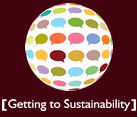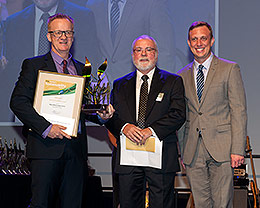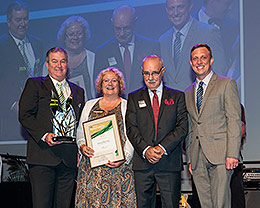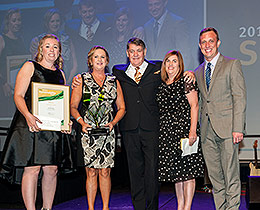Every year, the Queensland Premier’s Sustainability Awards recognised the achievements of communities, schools, individuals, businesses and industries in adopting sustainable business practices. Now in its seventh year, the 2016 Premier’s Sustainability Awards raise the profile of business sustainability as a strategy for business competitiveness.
Nearly 150 nominations were received from across Queensland from businesses, rural landholders, schools, communities and individuals for this year’s awards. Each of the category winners represents diverse enterprises. Their achievements span corporate strategy, industrial eco-efficiency, rural sustainability, effective responses to climate change, urban development, community projects and new technologies.
Premier’s Award
Winner: Mater Misericordiae Ltd – Sustainability at Mater
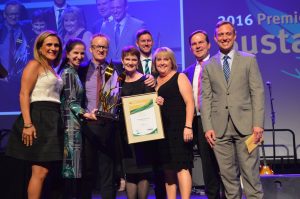
Pictured: Joanna Vasiliou, Katherine Jackman, Chris Hill, Ngaire McGaw, and Arna Chauncey with Ministers Mark Bailey and Steven Miles and sponsor, Becher Townshend (Expanded Polystyrene Australia)
- Despite the challenges of 24/7 operations in the resource-intensive health sector, Mater is leading the way in sustainability initiatives.
- The Sustainability at Mater program incorporates over 170 projects, involving thousands of staff and resulting in $3.5 million in savings since 2008. Sustainable practices are included in all aspects of the organisation – including energy and water use, waste management, procurement, facilities design, stakeholder engagement and transport.
- The program has achieved significant results – electricity costs have reduced by more than 17 per cent since 2012; clinical waste has reduced by 185 tonnes per year since 2011; and recycling has increased by more than 140 tonnes since 2010.
- Key to the success of the program is staff engagement. More than 3,300 staff members have signed the environmental sustainability pledge.
Minister’s Award for Leadership in Sustainability
Winner: Mungalla Aboriginal Business Corporation – Sustainable rehabilitation of a culturally sensitive wetland
Pictured: M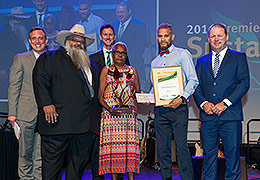 inister Steven Miles, Minister Mark Bailey, Mungalla Aboriginal Business Corporation representatives, Dave O’Brien (Glencore)
inister Steven Miles, Minister Mark Bailey, Mungalla Aboriginal Business Corporation representatives, Dave O’Brien (Glencore)
- The Mungalla wetland, a vital ecosystem adjacent to the Great Barrier Reef, has been completely restored, thanks to an innovative rehabilitation program led by the Traditional Owners – the Nywaigi [phon: “nu-wah-gee”], people.
- Once overrun by freshwater weeds of National Significance, the wetland is now a thriving breeding ground once again.
- Key to the restoration project was the removal of an earth wall which had been restricting tidal flows for decades, degrading the wetland to the point where little or no aquatic life existed below the layer of weeds.
- The reintroduction of salt water has killed the weeds, improved water quality and stimulated the growth of saline-specific native flora.
- This rehabilitation project has led to the discovery of nine species of fish previously unrecorded in the area and an increase in the numbers of iconic birds using the wetlands.
Built Environment Award
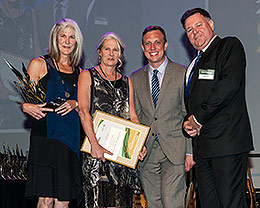
Winner: Borgelt & Craig Architects – Sustainable fashion home studio
Pictured: Deborah and Julie Craig (Borgelt and Craig Architects), Minister Steven Miles and Neil Horrocks (CitySmart)
- Borgelt and Craig Architects have transformed a small suburban house into a multifunctional home-studio for Rant Sustainable Clothing.
- The building, based at The Gap, embodies each of the core principles of the clothing business – Ethical, Natural, Local – with the architects sourcing affordable, local, sustainable and recycled products to reduce the carbon footprint and improve efficiency.
- The home-studio now uses 50 per cent less water than the average household and 90 per cent of its power comes from on-site solar panels.
Winner: Mater Misericordiae Ltd – Sustainability at Mater
Pictured: Chris Hill (Mater), Charlie Foxall (Carlton and United Breweries), Minister Steven Miles
- Despite the challenges of 24/7 operations in the resource-intensive health sector, Mater is leading the way in sustainability initiatives.
- The Sustainability at Mater program incorporates over 170 projects, involving thousands of staff and resulting in $3.5 million in savings since 2008.
- Sustainable practices are included in all aspects of the organisation – including energy and water use, waste management, procurement, facilities design, stakeholder engagement and transport.
- The program has achieved significant results – electricity costs have reduced by more than 17 per cent since 2012; clinical waste has reduced by 185 tonnes per year since 2011; and recycling has increased by more than 140 tonnes since 2010.
- Key to the success of the program is staff engagement. More than 3,300 staff members have signed the environmental sustainability pledge.
Winner: Moreton Bay Regional Council – Community Waste Minimisation program
Pictured: Cr Peter Flannery, Anita Christian (Moreton Bay Regional Council), Geoff Elliott (Queensland Water and Land Carers), Minster Steven Miles
- Through its annual Waste Education and Engagement Strategy, the Moreton Bay Regional Council actively encourages waste minimisation through best-practice recycling and resource recovery initiatives.
- At the heart of the Council’s sustainability program are its partnerships with more than 50 local schools and 30 early learning centres, along with local businesses, community groups and individuals.
- The emphasis is on reducing the volume of waste going to landfill and increasing the amount diverted to recycling, with one school reporting a 62 per cent reduction in landfill waste in one year.
- Moreton Bay Regional Council also runs community recycling events including presentations, waste facility tours, repurposing and worm farming workshops and organic composting, along with coordinating the local Clean Up Australia Day efforts.
Innovation in Sustainable Technologies Award
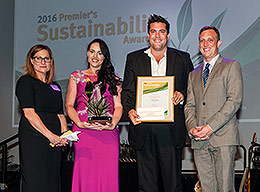
Winner: Natural Evolution – Nutro Lock
Pictured: Karen Fitzgibbon (Chamber of Commerce and Industry Queensland), Krista and Rob Watkins (Natural Evolution), Minister Steven Miles
- In North Queensland, an average of 450 to 500 tonnes of green bananas are wasted each week.
- Frustrated at throwing away tonnes of undersized or mishapen bananas because they didn’t meet supermarket specifications, Rob and Krista Watkins came up with an innovative and sustainable solution.
- Their Natural Evolution’s Nutro Lock process preserves fresh fruits naturally and quickly – in as little as 25 minutes – without the need for additives or preservatives. This preservation process has been key to the production of their popular Banana Flour.
- Now, Natural Evolution has the capability to extend the limited shelf-life of any fruit or vegetable – not just bananas – by up to three years, vastly reducing waste outputs.
Rural Award
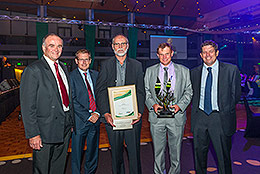 Winner: MSF Sugar – Sustainability in modern farming practices
Winner: MSF Sugar – Sustainability in modern farming practices
Pictured: Trevor Cook, Hywel Cook, Alan Cross, Isaac Schmidt and Andrew Dougall (MSF Sugar representatives), Peter Thompson (Nugrow)
- MSF Sugar is Queensland’s largest sugar cane farmer with operations in the Wide Bay and Cairns regions and recently launched an innovative sustainability system called Modern Farming.
- Modern Farming draws together best practice technology into a package of farming techniques which aim to reduce water and fertiliser volumes, re-use mill wastes, improve yields and save money.
- The initiative is linked to the company’s decision to achieve Smartcane Best Management Practice accreditation for all of its properties.
- MSF Sugar has also exported Modern Farming to its Thailand-based owners, Mitr Phol [phon: “mitt pol”], the fourth largest sugar producer in the world, to deliver improved farming techniques, yields and environmental performance for its operations in Thailand, Laos and China.
Winner: Fun over fifty – Being seen, Being green
Pictured: Cassie Fitton, Toni Brennan, Rob Archibald (Fun Over Fifty), Rebecca Andrews (The Department of Tourism, Major Events, Small Business and the Commonwealth Games), Minister Steven Miles
- Fun Over Fifty is a multi-award winning travel company for the 50-plus market, with a mission to be the most sustainable tour operator in Australia.
- Sustainability practices are embedded in all levels of the business, with an emphasis on – reduce, reuse and recycle – to increase environmental efficiency and improve the guest experience.
- With 27 Tourism Australia Eco Certified tours on offer, travellers with Fun Over Fifty can gain a greater appreciation of our unique natural wonders. All suppliers are selected based on their commitment to the environment.
- A Green Guest option is also available to passengers, offering a reduced daily room fee for those who choose not to have their rooms serviced.
Sustainability in Education Award
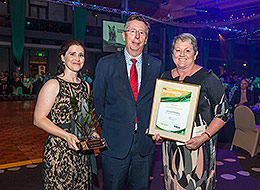
Winner: Junction Park State School – Unlocking our environment and heritage
Pictured: Staff from Junction Park State School, Prof. John Cole (University of Southern Queensland)
- With Junction Park State School recently listed on the Queensland Heritage register, programs to explore the school’s traditions and environment have become core elements of the curriculum.
Waste reduction practices are taught to students in every year level and the school offers unique opportunities to engage with the community to promote sustainability. - In partnership with Woolworths Annerley, the school has implemented a soft-plastics recycling program – resulting in a 1400 per cent increase in the amount recycled.
- The school has also made the switch to electronic communications by emailing newsletters, invoices and report cards to families instead of sending hard copies, resulting in a huge reduction in paper use and printing costs.
Sustainable Heritage Award
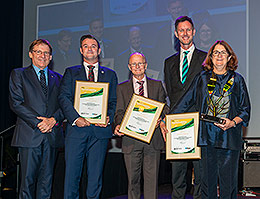
Pictured: Prof. Peter Coaldrake (Queensland Heritage Council), Brad Cordery (QLD Anzac Centenary Program), Councillor Norm Wyndham (Brisbane City Council), Minister Mark Bailey, Megan Jones (Tanner Kibble Denton Architects)
Winner: Brisbane City Council, Queensland Anzac Centenary Coordination Unit and Tanner Kibble Denton Architects – Anzac Square restoration
- The 85-year old, State heritage-listed Anzac Square in Brisbane’s CBD, has been respectfully conserved to ensure its cultural significance is protected for future generations.
- A joint initiative by Brisbane City Council and the Queensland Government, the restoration project focussed on rectifying structural defects and damage from water infiltration.
- Materials were carefully selected for their environmental qualities, durability and compatibility with the original design.
- The project also incorporated the innovative use of interactive videos, screens and story-telling panels to enhance the visitor experience.
- These substantial upgrades have helped to maintain the legacy of Queensland men and women who have served in war, conflict and peace-keeping efforts around the world.
Young Achiever’s Award
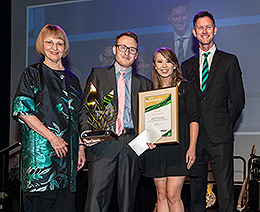
Winner: Jacob Welch – Teys Australia
Pictured: Prof. Carol Dickenson (Queensland University of Technology), Jacob Welch (Teys Australia), Bindi Irwin (2015 Young Achievers award winner), Minister Mark Bailey
- Over the past three years, environmental officer Jacob Welch has been involved in the design, construction and commissioning of a state of the art wastewater system and renewable energy project at Teys Australia’s Beenleigh Facility.
- The $12 million project delivers significantly improved water quality along with renewable biogas energy.
- The amount of renewable energy generated on site is equivalent to the natural gas consumption of 423 homes per annum. The project also reduces the facility’s carbon emissions by 33,100 tonnes per year.
- Jacob’s team has delivered resource efficiency projects resulting in a 40 per cent saving in water, a 43 per cent reduction in use of natural gas, and six per cent reduction in energy use.
For more details on finalists visit https://www.ehp.qld.gov.au/premiersawards/2016-finalists-winners.html
